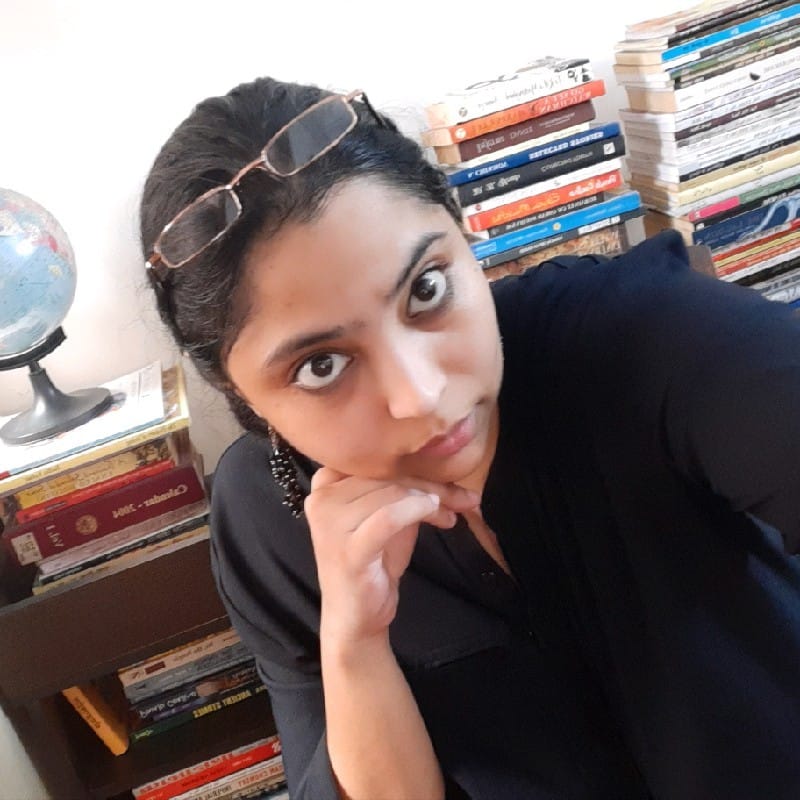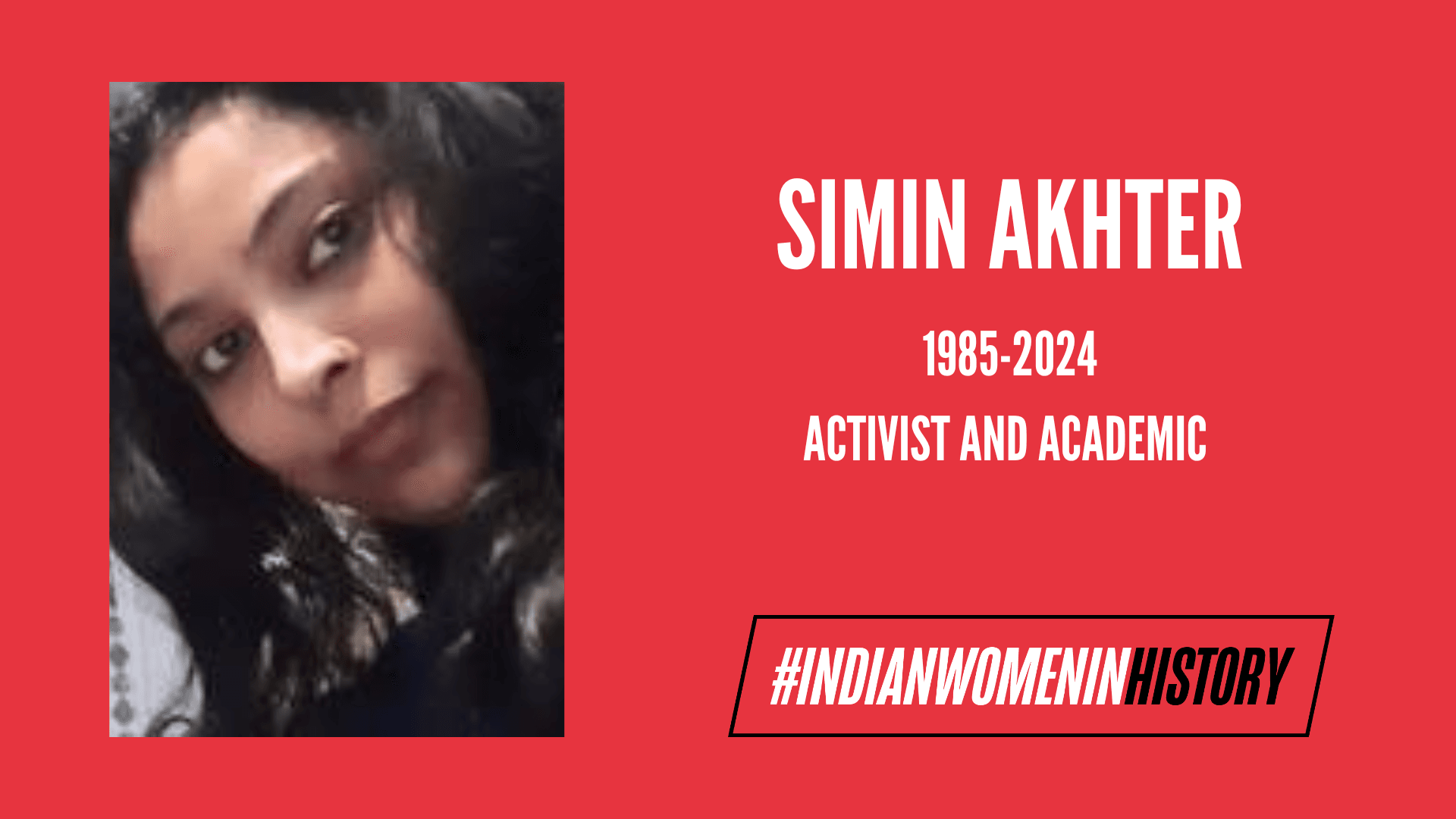Dr. Simin Akhter Naqvi was an academic, activist, poet, author, and artist whose legacy transcends time, leaving an indelible impression on hearts and minds alike. Dr. Naqvi tirelessly fought against gender inequity, caste-based discrimination, and labour exploitation, advocating for the dignity and rights of marginalised communities. She was a radical feminist but with an expression that was accommodating.
Simin’s early life and education
Born on January 17, 1985, Dr. Naqvi displayed extraordinary promise from an early age. She completed her schooling at CRPF Public School, Rohini, where her leadership qualities shone brightly as she served as head girl. She was a wonderful artist, and she painted many canvases. She was also a taekwondo player. Her poetry got her a personal commendation from the then Prime Minister and celebrated poet, Mr. Atal Bihari Vajpayee—a moment that captured her extraordinary talent and courage.

She pursued her undergraduate degree at Satyawati College, University of Delhi, graduating in 2006, and went on to complete her post-graduate studies at the Department of Economics, Jamia Millia Islamia (JMI), in 2008. She was the one who started the departmental journal “Rise” during her time at JMI. Dr. Naqvi did her Ph.D. from the Centre for Social Exclusion and Inclusive Policy at JMI, titled Labour Markets and Welfare: Impact of Exclusion Among Muslims in the NCR.
Dr. Naqvi had that rare ability to blend her intellectual endeavours with her activism. She was deeply read about the intricate interaction between exploitation and oppression, and her research sought to bring out these complexities in a manner that was theoretically rigorous and empirically grounded but in a manner that was accessible.
Professional journey
Dr. Naqvi’s teaching career began in 2008 at Zakir Husain Delhi College, University of Delhi, where she became a cornerstone of the institution. Her areas of academic interest include labour markets, gender sociology, and political economy. Her engaging teaching style, empathy, and genuine care for her students made her one of the most beloved and respected educators in the university. She inspired countless young minds, encouraging them to challenge societal norms and strive for excellence.
Activism and advocacy
Dr. Naqvi was a fearless activist whose work was deeply rooted in her unwavering commitment to social justice. She was a huge advocate of gender justice. She constantly spoke of the concepts of gender fluidity, LGBTQIA+ rights, and disability studies. She was very active in politics in the last years of her life. As an activist, she was fearless and very vocal for her students. Many times, she used to push her colleagues as well to stand with the students. Along with fearlessness, she was an empathetic individual. She was always there for the non-teaching staff and fought for their rights.
Her students dearly called her “Zinda Dil Insaan.” When the RG Kar rape case happened, the students of Zakir Hussain College decided to protest on the campus. The administration didn’t let the students protest. Simin stepped in and made sure that the protest took place at the college gate.
She was also a very significant part of the Common Teachers’ Forum, which started in 2009 as an attempt to coordinate opinions on the imposition of the semester system. She joined CTF much later in her life of political activism but was very active in CTF. She always brought an important and critical aspect to CTF’s functioning as an Ambedkarite-Marxist group. She brought an umbrella solidarity, where she included more new members from the grassroots.
Poetry: A form of resistance
Dr. Naqvi used to write poetry from her school days. Along with being a good writer, she was a wonderful orator as well. She was well-versed in Hindi, English, as well as Urdu. Her poetry reflected her politics, which spoke highly of the marginalised and sought equality and social justice. Out of the poetry she used to write, her protest poetry was one of the most vibrant ones. It was reported that her poetry book was soon to be published, and she was quite excited about the same.

In the bleak times we are in, Simin never feared speaking against the genocide happening in Palestine. For the same, she wrote poetry too, as it was a medium to protest for her.
Following are a few lines of the same:
“Bomb the cities,
destroy all the schools
and hospitals you want,
but from the rubble and the ashes,
the children will rise,
like a dust storm,
and spread across lands and seas,
like stories.“
“Mere Pyaare Bachche“: Naqvi’s concern for mental health
Simin, from her school days, was an exceptional student. She was always doing multiple things, and doing so was not an easy task. Being a Muslim woman, constantly speaking for the rights of minorities, and fighting with those in power was mentally very exhausting. However, she never hid her mental health concerns. She was a huge conversationalist. Whenever she was going through a rough patch mentally, she openly used to speak about the same with colleagues, friends, and even her students.
Dr. Naqvi was very sensitive towards mental health. She was always concerned about her people, students, and colleagues. Under her leadership, there were many programs and mental health sensitisation sessions that took place. She was always available for a conversation with her students. There was something about Simin, so beautiful, that she used to look at people around her and understand that they were not alright. She used to arrange professional psychological consultation and legal aid for students in distress.
She was always afraid that someone might come and hurt her students and friends. Simin used to call her colleague Dr. Vijender Chauhan, Associate Professor of Hindi, and her sister Dr. Shirin Akhter, Associate Professor, Department of Economics, “bachche,” despite being very young to them.
Simin against constant saffronisation
As a Muslim feminist woman, Simin was always aware of her identity and the importance it plays in the very movement she was a part of. She was always concerned for her fellow Muslim colleagues. On a personal front, after 2014, when the ruling government came into power, which aimed to create a Hindutva state, Simin used to express her fear and concern for the Muslims, particularly women. She used to speak about the same to her friends as well.
Dr. Naqvi’s mother was a professor of economics at Satyawati College, University of Delhi, and his father was working at Jamia. Due to the same Simin, from her very childhood, had political consciousness of her Muslim identity. Whenever, in her college and outside, there used to be conversations about the inclusion and rights of women, she was very vocal for Muslim women. It was always very difficult for her concerning the rising hatred against Muslims in the university. For the same, many times, she went against the administration as well.
She was always very vocal about the Muslims at the university. In 2021, when Delhi University, after ten years, decided to have interviews for permanent appointments of professors in place of the earlier teaching ad-hocs, she expressed her concern that the current government would target Muslims and throw them out. Muslim professors were already fewer in number, and through politically motivated interviews, hardly a few Muslim professors were reinstated. Dr. Naqvi raised this concern even during the election times when it was so unsafe to even speak.
A multifaceted legacy
Dr. Naqvi’s influence extended far beyond academia. As a poet and author, her writings captured the struggles and resilience of marginalised communities, echoing their hopes and dreams with elegance and grace. Her artistry extended to the canvas as well, where her sketches and paintings reflected the beauty and depth of her inner world. Every aspect of her life, from her intellectual pursuits to her creative expressions, was a testament to her unwavering commitment to challenging discrimination and systemic injustice.
Untimely farewell
On October 21, 2024, Dr. Simin Akhter Naqvi’s untimely passing left her family, friends, and academic community in profound sorrow. Her brilliance, compassion, and boundless zest for life were extinguished far too soon, leaving a void that can never be filled.
Yet, her legacy still lives on. Dr. Naqvi’s contributions as a scholar, teacher, poet, activist, and artist continue to inspire and guide those who had the privilege of knowing her. She remains a beacon of intellect, creativity, and empathy—a reminder that a life lived with purpose and passion is never truly lost.
In her short but extraordinary journey, Dr. Simin Akhter Naqvi proved that one life, when lived with courage and conviction, can illuminate countless others.
References:
- https://www.facebook.com/profile.php?id=100018948615928
- Interview with Dr. Shirin Akhter, Associate Professor, Department of Economics and sister of Dr. Simin Akhter
- Interview with Dr. Vijendra Chauhan, Associate Professor, Department of Hindi and a friend of Dr. Simin Akhter
- Interview with Sachin N, Associate Professor, Department of Physics, Dyal Singh College and a friend of Dr. Simin Akhter
About the author(s)
Jatin Chahar (he/they) is a student of Philosophy at Ramjas College, University of Delhi. His writing stems from critical reflection on various socio-political issues, particularly gender and politics. Art is resistance for him. He loves making art that serves the masses and brings forward the realities of the power structure of contemporary societies which excludes marginalised sections of society. He is also into photography and filmmaking. His major areas of research interest are caste, class, and their intersection with sexual fantasies.





